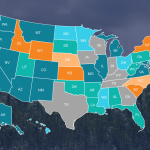Without a national program, cannabis business applications vary widely. While states like Illinois and Missouri license cannabis businesses through a state-wide program, states like California and New Jersey are allowing municipalities to run their own licensing processes. In addition to differences in state and municipal programs, there is no standard application format. This means almost every application is unique with distinctive requirements, formats, and challenges.
In areas with state-led licensing, applications are typically accepted during a predetermined window of time, and once the submission deadline has passed, no further applications will be accepted. Though the state may open another application submission process in the future, there is no guarantee on when that will take place. Although states with municipal applications will also require state approval to license a cannabis business, the municipal level cannabis business application is crucial. Municipalities may only allow application submissions during set licensing periods, but the state will often allow submissions on an ongoing basis to accommodate varying municipal submission deadlines.
Strategies for Merit-Based Cannabis Business Applications
State-led licensing programs usually feature a form of merit-based cannabis business applications. In a merit-based process, applicants for a cannabis business license are graded against a rubric and only the top scorers receive approval.
If the grading rubric is provided, applicants should ensure that they include all requested components in their submission. Sometimes though, the rubric is not provided. If this is the case, the strategy should be to ensure compliance with all applicable rules and regulations, as well as adherence to cannabis industry best practices for the business type. Either way, winning a merit-based cannabis business license can be a challenging task and typically requires assistance from professionals to succeed.
“Merit-based applications depend highly on the reviewer, so quality control is challenging and becomes an art form,” said Leo Falgout, Chief of Staff at Sapphire Risk Advisory Group. “Plus, with the limited licenses, you can get a ‘passing’ score and still lose.”
In these merit-based applications, prospective cannabis business owners must not only obtain a ‘passing’ score, but must also score higher than other applicants to receive one of the limited number of available licenses. Applications with scores lower than ~90% typically do not win in merit-based application rounds, and winners and losers can be separated by only a fraction of a point. Using professional application writers, consultants, and subject matter experts, applicants can ensure they put together a winning submission that is not only compliant, but is superior to other applications.
Strategies for Pass/Fail Cannabis Business Applications
Municipal-led licensing programs are more likely to utilize pass/fail grading to determine the recipients of cannabis business licenses. In these types of licensing processes, applications either win or lose with scoring typically, though not always, focusing on regulation compliance. Prospective cannabis business owners should utilize the entirety of the allotted page/word count to ensure that anything the regulatory authority might be looking to see is present in the application, whether a grading rubric is published or not.
“In my opinion, the pass/fail process is much harder than a merit-based score,” said Tony Gallo, Managing Partner of Sapphire Risk Advisory Group. “The challenge I see with pass/fail is that it is just that – you either pass, usually with a 100%, or you fail and move to the back of the line. Usually, if you are moved to the end of the line you probably won’t be awarded a license, at least for the time being.”
Although pass/fail licensing does not always have a license cap and applicants with failing scores may have a chance to correct their errors, failure can cause lengthy delays for prospective cannabis business owners that could lead to abandoning the venture altogether. Since it could take months or even years for another chance to score the application, those involved and/or invested in the project could back out or move on. A better strategy is to ensure that the best possible application is submitted the first time by using professionals.
Pass/fail applications may pose an additional challenge when combined with short completion timeframes and/or when licenses are awarded on a ‘first come, first served’ basis. With timeframes ranging from only 1-4 weeks, the strategy becomes finding a balance between speed and quality. If such a tight timeframe was not imposed, prospective business owners and their team of contracted experts may choose to spend months putting together their ideal submission. However, within the constraints of a ‘race to submit’ application round, the proposed company’s security plan, business plan, floor plan design, and other crucial documentation could be put together within only a few days. When this is the case, hiring experts is the best strategy to putting together a winning submission quickly.
How Can Sapphire Risk Help?
Tony Gallo and the team of experts and consultants at Sapphire Risk Advisory Group have worked in 34 states and are ready to work in Idaho, Nebraska, and Kansas when these states legalize. Follow us on social media to stay up to date with more security best practices and cannabis industry updates!
Author

Katharine Baxter is the Lead Technical Writer and Industry News Editor for Sapphire Risk Advisory Group and is responsible for creating compliant security plans for cannabis business license applications. Katharine obtained her two Bachelor’s degrees in Journalism and Political Science and has worked in the cannabis industry for over two years. Katharine is a published author on cannabis and security and has covered topics such as cannabis security best practices and industry legal updates.
- California Senate Bill 69 Adds CEQA Requirements for New Cultivators

- Top 5 Cannabis Security and Surveillance Violations

- Peace of Mind in the Retail Sector: Facility Security

- Opportunities in the Ohio (O-High-O) Cannabis Market

- Building Security and Trust: Verifying Identification and Payments

- The Importance of Loss Prevention

- Thoughts to Improve Cannabis Security Regulations Across the Nation

- Opportunities in the Minnesota Cannabis Market

- U.S. Cannabis Legalization 2023 Update

- How to Present Your Cannabis Business Vision to Your City


